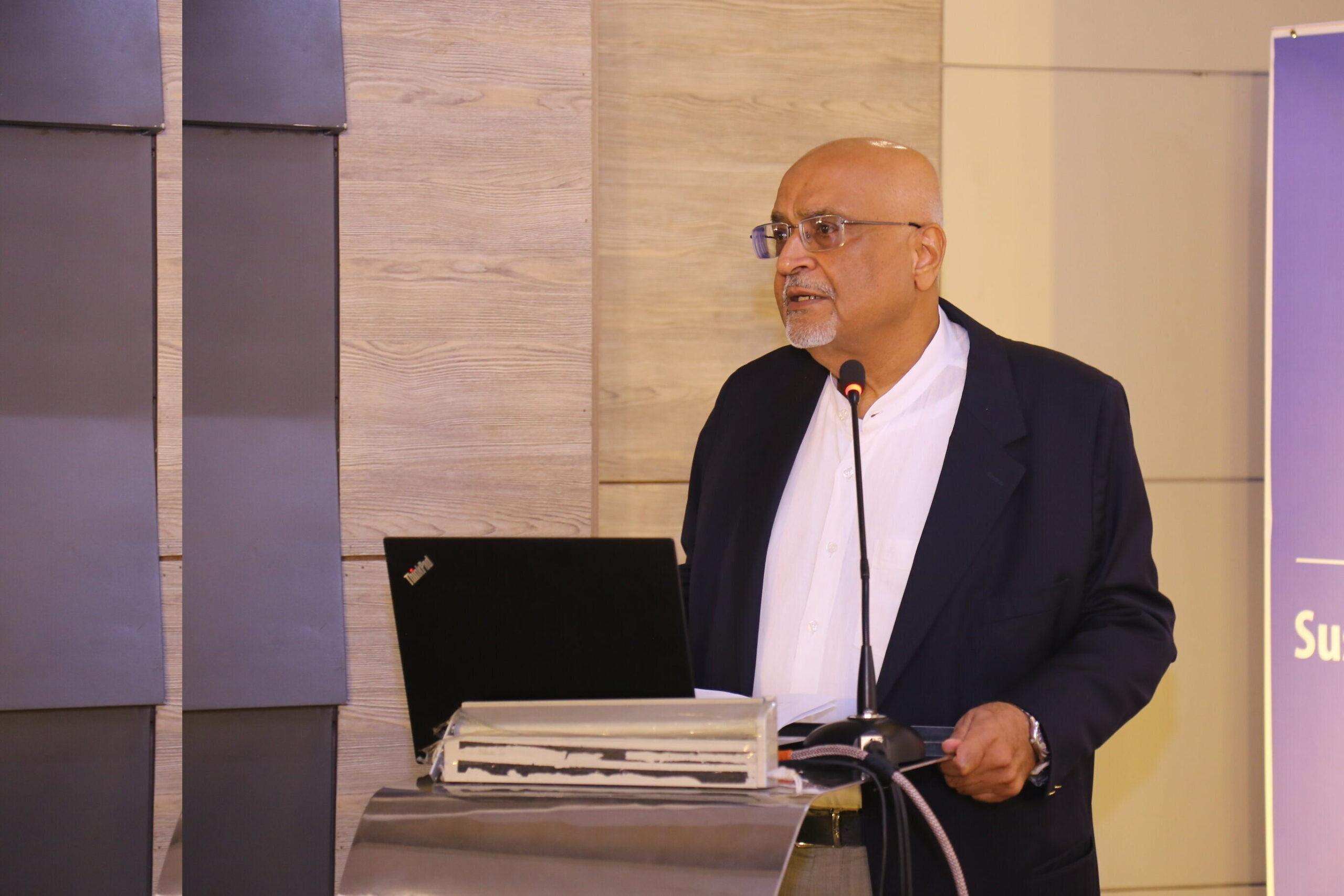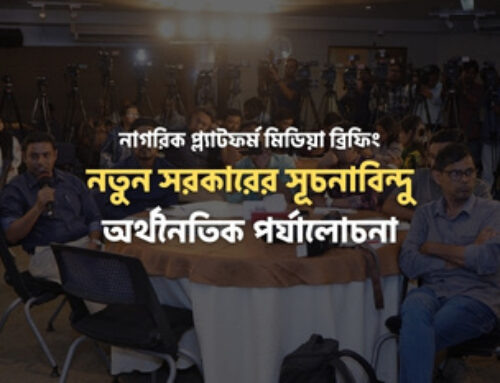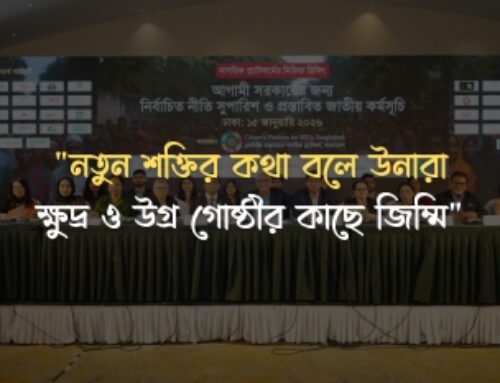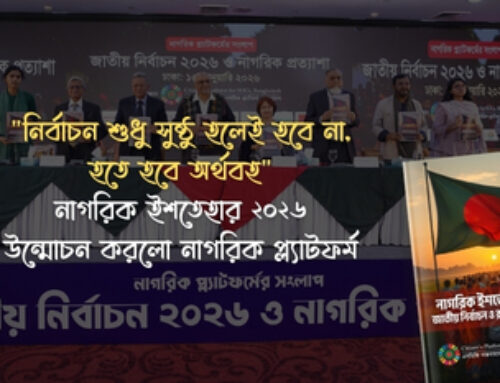During the upcoming LDC transition, environmental compliance and labour rights are two issues that will figure prominently for Bangladesh’s overseas market access. Sustainability reporting, which is a standard that publicly discloses a company’s environmental, social, and governance practices, will be critical to this end. In Bangladesh, there is a need to have an institutional framework to promote and guide this practice for the sake of stronger and sustainable private sector growth.
These aspects were emphasised at the dialogue titled “Sustainability Reporting by the Private Sector in Bangladesh: Expectations and Experience” hosted by the Citizen’s Platform for SDGs, Bangladesh, in partnership with United Nations Development Program (UNDP) Bangladesh and United Nations Environment Program Poverty-Environment Action, held on October 29, 2022, at the Auditorium, BRAC Centre Inn, Mohakhali, Dhaka.
 Mr Towfiqul Islam Khan, Senior Research Fellow, CPD delivered the keynote presentation. He highlighted that sustainability reporting helps the private sector ensure that short-term profits do not turn into long-term liabilities. In Bangladesh, there have been limited efforts to collate the Sustainability Reports prepared by the private sector because of sustainable development goals (SDGs) and review them under a single framework. The sustainability reporting can inform the policymakers as regards the state of the sectors and contribute to developing sectoral and national policies in the form of a formal and useful instrument as the country prepares itself for the LDC transition
Mr Towfiqul Islam Khan, Senior Research Fellow, CPD delivered the keynote presentation. He highlighted that sustainability reporting helps the private sector ensure that short-term profits do not turn into long-term liabilities. In Bangladesh, there have been limited efforts to collate the Sustainability Reports prepared by the private sector because of sustainable development goals (SDGs) and review them under a single framework. The sustainability reporting can inform the policymakers as regards the state of the sectors and contribute to developing sectoral and national policies in the form of a formal and useful instrument as the country prepares itself for the LDC transition
Mr Khan pointed that 49 DSE listed companies (15%) out of 320 submitted sustainability reports in 2019, with only 11 following the standard reporting framework (3%). The presentation identified several challenges in this context, including lack of awareness, dearth of capacity, absence of culture, weak corporate governance, unavailability of strong regulatory guidance and vague incentives for the private sector in Bangladesh. Mr Khan recommends a gradual move toward mandating sustainability reporting from the present practice of voluntary measures. Regular analysis of all reports can improve SDG reporting from the private sector’s perspective. Also, the government should consider establishing an institutional framework for regular monitoring and analysis of sustainability reporting in Bangladesh.
The dialogue was moderated by Dr Debapriya Bhattacharya, Convenor of the Citizen’s Platform for SDGs, Bangladesh and Distinguished Fellow, Centre for Policy Dialogue (CPD).  He mentioned that sustainability reporting is significant in the process of LDC graduation and SDG. We should include a strategy paper in the LDC. Otherwise, we can’t achieve northern values. We also should focus on relational data. Still, there is a lack of awareness in preparing sustainable reports. He also mentioned two types of failures: regulatory failure and market failure. We have to understand this concept more clearly for a deeper dive into sustainability. Everyone should be included in the process of achieving sustainability regarding the general masses. University Grant Commission should also take steps to include sustainability in curricula. Citizens of Bangladesh can be included in the process of achieving sustainability with the help of the private sector, political leaders, and development workers. Among all stakeholders, large corporate entrepreneurs are the lead representative of sustainability. He requested corporate leaders to come up with their visions for strengthening sustainability.
He mentioned that sustainability reporting is significant in the process of LDC graduation and SDG. We should include a strategy paper in the LDC. Otherwise, we can’t achieve northern values. We also should focus on relational data. Still, there is a lack of awareness in preparing sustainable reports. He also mentioned two types of failures: regulatory failure and market failure. We have to understand this concept more clearly for a deeper dive into sustainability. Everyone should be included in the process of achieving sustainability regarding the general masses. University Grant Commission should also take steps to include sustainability in curricula. Citizens of Bangladesh can be included in the process of achieving sustainability with the help of the private sector, political leaders, and development workers. Among all stakeholders, large corporate entrepreneurs are the lead representative of sustainability. He requested corporate leaders to come up with their visions for strengthening sustainability.
Mr Saber Hossain Chowdhury, MP, Chairman, of the Standing Committee on the Ministry of Environment, Forest and Climate Change Bangladesh Parliament was present as the Chief Guest of the dialogue. He said we should talk about the importance of sustainability reporting and how it can benefit the private sector.  To this end, there are three motivations for the private sector: cost reduction, profitability, and increased income. The process should start from the micro-level industry, and that is the key. ‘Sustainability’ can be the theme of the next budget if private sectors can influence the government with their recommendation. Consumers should also be included in the process of promoting and implementing sustainability. Finally, he suggested everyone should adopt and promote sustainability not only as a process but also as a culture.
To this end, there are three motivations for the private sector: cost reduction, profitability, and increased income. The process should start from the micro-level industry, and that is the key. ‘Sustainability’ can be the theme of the next budget if private sectors can influence the government with their recommendation. Consumers should also be included in the process of promoting and implementing sustainability. Finally, he suggested everyone should adopt and promote sustainability not only as a process but also as a culture.
Professor Mustafizur Rahman, Distinguished Fellow, CPD recommended that companies make a business case out of it as a part of company valuation to make it more quantifiable.
Mr Amitabh Chakraborty, Additional Director, Sustainable Finance Department, Bangladesh Bank said that Bangladesh Bank has been emphasising sustainability since 2008. They think that sustainability reporting is a vital step in promoting sustainability. Though Bangladesh Bank has promoted sustainability reporting, no formal regulation is currently in place. They are expecting to publish a structured report on sustainability within 2030.
Mr Prasenjit Chakma, Assistant Resident Representative, United Nations Development Programme (UNDP) Bangladesh, said that we must figure out the regulatory status of the reporting process, whether it should be voluntary or mandatory, and measure the awareness level among the companies as well as consumers. The role of UNDP here can be setting a regulatory standard and proposing a draft policy setting. He emphasised that compliance measurement is needed for market access in the future.
Mr Asif Ibrahim, Chairman, Chittagong Stock Exchange, regretted that most Bangladeshi companies do not have the required human resource expertise or experience to prepare sustainability reports. Comprehensive research on such standards is also absent at the company level. Technical assistance and potential knowledge sharing are both crucial components for developing reporting skills. He recommended that stock exchanges and non-listed companies should guide listed companies should be guided by individual banks.
Several prominent business leaders contributed to the dialogue, including Mr. Kamran T. Rahman, Senior Vice President, of the Metropolitan Chamber of Commerce and Industry (MCCI), Mr Fazlul Haque, Former President of BKMEA, Mr Shams Mahmud, Former President, Dhaka Chamber of Commerce & Industry (DCCI), Mr Zaved Akhtar, CEO of Unilever Bangladesh Ltd., Ms Ferdaus Ara Begum, Chief Executive Officer, of Business Initiative Leading Development (BUILD), Mr Lutfar Parvez, Director, Supply Chain Operations, American & Efird (Bangladesh) Ltd. Among other experts, Dr M Abu Eusuf, Executive Director, RAPID and Professor, Department of Development Studies, University of Dhaka, Ms Sharmind Neelormi, Associate Professor, Department of Economics, Jahangirnagar University, Mr Farkrul Ahsan, Chief Technical Advisor, Strengthening Institution Capacity for SDGs Achievement in Bangladesh (SC4SDG), UNDP and Mr Raquibul Amin, Country Representative, International Union for Conservation of Nature (IUCN) were also present.





Leave A Comment